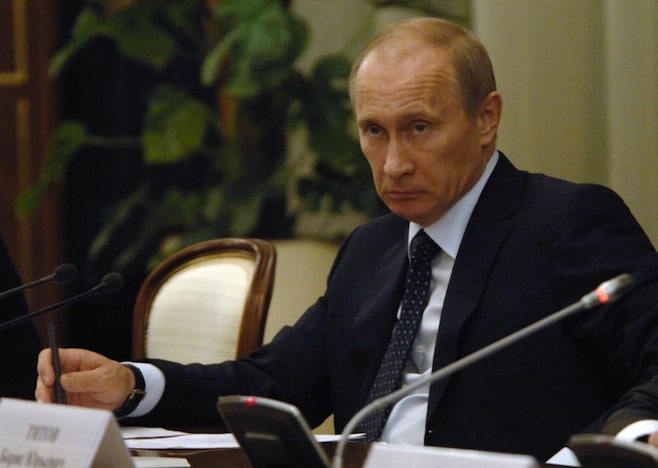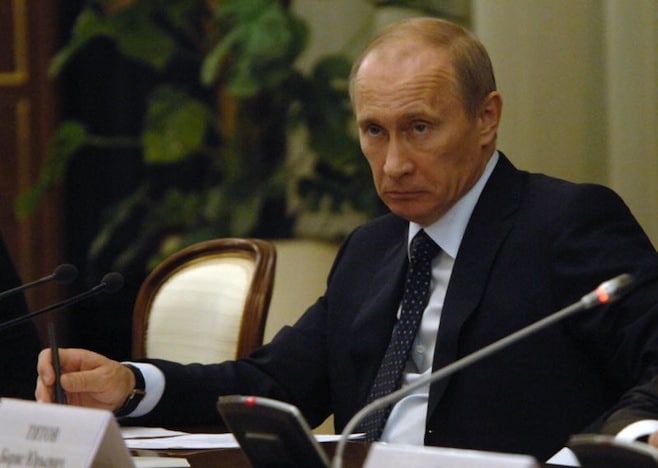
The annual meeting of Russia’s Federal Security Service (FSB), which is the successor organization to the Soviet-era KGB is an important occasion to take the temperature in the ‘East-West’ relations. (The Cold War cliche is becoming useful once again.) President Vladimir Putin’s customary address at the FSB meeting was the hallmark of the occasion on Friday in Moscow.
The sensational part of Putin’s speech is his disclosure that the FSB is in possession of definite information that plots are being hatched in the West to stir up political turmoil in Russia as the country heads for crucial parliamentary election in October. Putin avoided the use of the expression “color revolution” but hinted at it. To quote him:
Of course, you (FSB) must also prevent any attempts from outside to intervene in our election and our country’s political life. As you know, such methods exists and have been put to use in a number of countries. Let me say again that this is a direct threat to our sovereignty and we will respond accordingly.
I read the regular documents you (FSB) prepare, read the summaries, and see the concrete indications that, regrettably, our ill-wishers abroad are preparing for these elections. Everyone should therefore be aware that we will defend our interests with determination and in accordance with our laws.
Elsewhere, Putin noted that foreign intelligence agencies have “stepped up their activity” and this was “convincingly confirmed” insofar as the FSB’s counter-intelligence interdicted over 400 foreign intelligence operatives last year and criminal charges were initiated against 23 of them. He mentioned government organizations, military facilities, defence industry companies, energy sector and “leading research centres” as particularly vulnerable. Putin said, “We need to cut off all channels of access to confidential information.”
Altogether, a grim scenario has been projected here with regard to Russian-American relations through the remaining period of the presidency of Barack Obama. The core issue for Russia all along is that the US interferes in its internal politics with a view to create political disharmony and weaken the Kremlin, forcing it to adopt policies that are in harmony with American regional and global strategies.
Of course, the Russian side must also take blame for this strange paradigm. The fact remains that in the 1996 presidential election, Boris Yeltsin sought American money, political support and patronage to stop the tide of what seemed at that time a near-certain victory by the leader of the Communist Party Gennady Zyuganov.
There was large scale interference at that time on the part of the US and its European allies (and the IMF) and American ‘expertise’ certainly played a crucial role in ensuring that Yeltsin won. When the campaign began, Yeltsin’s rating stood at 6 percent and he ended up winning the election with 54 percent votes in runoff after a bruising first round with Zyuganov. (A contemporaneous account, here, by Monthly Review magazine gives fascinating details under the subtitle “Americans to the Rescue – a Russian Assignment.”)
Indeed, there is a big difference today. If in the mid-nineties US needed Yeltsin to continue in power, today the accent is on “regime change.” Russia’s resurgence under Putin’s leadership is anathema to Washington.
The US cannot countenance Russia (or any country for that matter) in such nationalistic mode, presenting formidable headwind against its global strategies. Unlike China, which can bend like Beckam, Russia is not willing to stoop to conquer. Its proud history simply doesn’t allow it to do that. (Incidentally, it remains to be seen whether Moscow will go along with the harsh terms of the US-China deal imposing a North Korea naval blockade.)
In the present context, the western sanctions against Russia are actually directed against the Kremlin. The US calculus pins hopes on the economic recession in Russia leading to social discontent, which would mar the ruling party’s chances in the election and in turn erupt as mass protests.
Putin has forewarned that Moscow will defeat any US design to instigate political turmoil in Russia, no matter what it takes. Trust Putin here. However, the big question remains: How could regional conflicts such as Syria or Ukraine be possibly addressed when the two big powers are locked in an existential struggle?
Ideally from the US perspective, the mayhem in Syria should rise to a crescendo by summer, putting the Russian intervention in that country in the crosshairs of Russian public opinion in the run-up to the election in autumn. Interestingly, Putin tasked the FSB to ensure 3 things: one, ensure “the safety of our pilots… in Syria and the anti-terrorist units working here inside Russia”; two, “ effectively seal off” Russian territories from infiltration by terrorists; and, three, “prevent the activities of underground groups” within Russia who could be planning terrorist strikes.
To be sure, compared with the enthusiasm that Putin initially voiced on Monday for the US-Russia deal on a ceasefire in Syria, he was noticeably guarded yesterday while addressing the FSB. Moscow would have sensed by now that the onus is being put squarely on the Kremlin by Washington to see that the ceasefire remains intact, while the US is either incapable or unwilling to rein in its militant regional allies such as Turkey.
Obama underscored on Thursday that ”a lot of that (ceasefire holding) is going to depend on whether the Syrian regime, Russia, and their allies live up to their commitments. The coming days will be critical, and the world will be watching.”
He then added, “many Syrians will never stop fighting until Assad is out of power. There’s no alternative to a managed transition away from Assad. It’s the only way to end the civil war and unite the Syrian people against the terrorists.”
Reprinted with permission from Indian Punchline.

